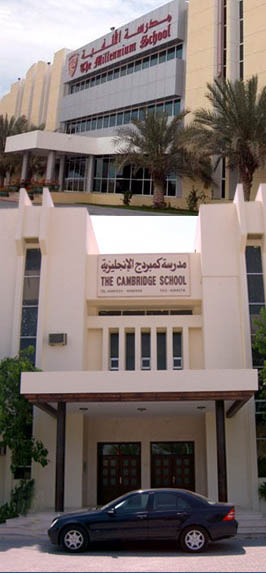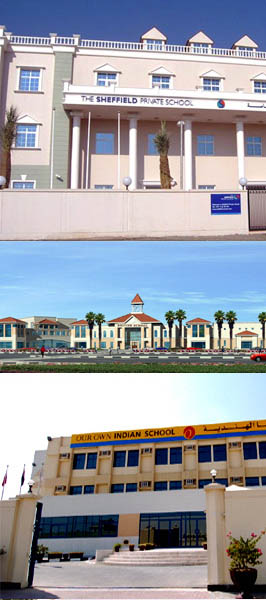Secondary
Length of programme in years: 3
Age level from: 15 to: 18
Certificate/diploma awarded: Secondary School Leaving
Certificate
Technical
Secondary School
Length of programme in years: 6
Age level from: 12 to: 18
Certificate/diploma awarded: Technical Secondary Diploma
Primary
school education is compulsory for all UAE citizens.
Government policy is to provide staff/student ratios
of 1:20 at kindergarten and primary levels; and 1:15
at intermediate and secondary levels.
Children with special needs
Special needs centres supervised by the Ministry of
Labour and Social Affairs cater to those with hearing
and physical disabilities, the visually impaired and
others with special needs. There are some major new
developments under way, including a large centre in
Abu Dhabi with 70 classrooms and 20 training workshops
and the Al Thikka Club which opened in Sharjah. The
Ministry of Education and Youth, together with the Red
Crescent Society, also opened a centre for autistic
children in Abu Dhabi, the first in a number of such
centres planned by the Ministry.
Higher
Education
Higher Colleges of Technology were established in 1988.
Located in Abu Dhabi, Dubai, Sharjah, Al Ain, Ras al-Khaimah
and Fujairah, these colleges prepare nationals for professional
and technological careers in both government and private
sectors. Since their foundation, the colleges have grown
significantly, with staff and students increasing by
about 30 per cent each year.
The
UAE University located in Al Ain, has eight faculties
and was established in 1976. In the last 24 years, it
has become a leading institution in education, research
and community service. The University is also proving
to be the most popular destination for students seeking
higher education in the UAE with over 15,000 students
currently studying at their facilities.
The
Centre for Excellence for Applied Research and Training
(CERT) runs a countrywide continuing education programme
for all nationalities. The programme has been designed
for professional development and personal enrichment
for people with an eye for continuing education.
Zayed
University was established in 1998 to prepare leaders
who will foresee the possibilities and capture the opportunities
that will create the future of the United Arab Emirates.
The University has campuses in Abu Dhabi and Dubai.
Enrollment on the campuses as of 2003 is over 2000 students,
all of them female nationals.
School uniforms and fees
School
Uniforms
Uniforms vary from school to school. However in many
schools the uniform resembles that worn in European
or American schools.
In
primary school the boys generally wear cotton shorts,
cotton shirt and a cotton sweater. Quite often these
are in colour combinations of blue, khaki or navy and
are worn with white socks and black leather shoes.
Primary school girls usually wear a cotton dress, cotton
sweater and white socks with black shoes. Again navy,
khaki and blue are popular colours.
For
sports children wear a polo style t-shirt with shorts,
sports socks and white trainers.
At
secondary school level the uniform is similar to that
of the primary school but boys have the option of trousers
instead of shorts and the girls may have a choice of
long shorts, trousers or a regular/long length skirt.
Again cotton shirts or polo shirts are worn with cotton
sweaters, white socks and black shoes.
School
Fees
Annual
tuition fees vary greatly between schools, private schools
being far more expensive than public ones. Generally
fees are calculated on a sliding scale - the fees increase
with the grade level of the student. Annual fees are
usually payable in two instalments, the first upon registration
and the second upon completion of the first term. There
are additional costs which may include transport, exam
fees, registration fees and book deposits etc.
Kindergarten
fees for private schools average around 10,000 Dhs per
annum which is roughly £2,120 sterling or $2,700
US dollars. Fees for Grade 12, which is the highest
grade in secondary schools, can be around 23,000 Dhs.
In sterling that is £4,900 and in US dollars $6,200.
These figures are considerably lower for state schools.
School
Curriculum
Schools
in the UAE follow a number of different curricula. Some
favour the American system and others use the British
version, but there are schools that offer both systems.
Because the curriculum varies between schools the information
given here should be taken as a general guide. At kindergarten
level the children are usually taught English and maths
along with Arabic, art, music, religion and other activities.
Click
here for a list of
private schools in Dubai.
|





